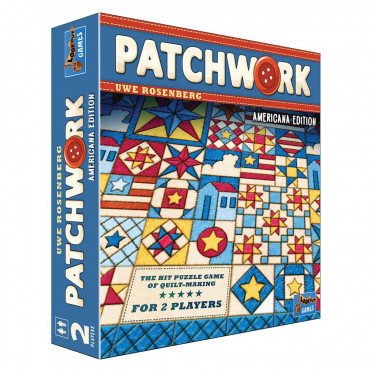Make a patchwork quilt and leave no holes visible to become the master of buttons!
On a turn, a player buys one of the three pieces of cloth after the marker, clockwise. To purchase a piece of cloth, you pay the button cost shown on the piece of cloth, move the marker to the location of that piece of cloth in the circle, add the piece of cloth to your game board, and then advance your time token on the time track by a number of spaces equal to the time shown on the piece of cloth.
You are free to place the patch anywhere on your board, as long as it doesn't overlap any other pieces of fabric, but you will most certainly try to leave as few empty spaces as possible. If your time chip is behind or on top of the other player's time chip, then you play another round; otherwise it's your opponent's turn. Instead of buying a piece of cloth, you can choose to pass; to do so, you move your time token to the space immediately after the opponent's time token, then take a button from the bank for each space you've moved.
In addition to the cost in buttons and time, each piece of cloth also has 0-3 buttons, and when you move your time token past a certain threshold on the time track, you earn "button income": add up the number of buttons represented on your personal game board, then take that number of buttons from the bank.
In addition, the time track represents five small pieces of leather. Whoever first passes over one of these leather pieces on the time track takes it and immediately places it on his or her game board.
Finally, the first player to completely fill a 7x7 area on his or her game board wins a bonus tile worth an additional 7 points at the end of the game. (Of course, this doesn't happen in every game.)
When a player takes an action that moves his time token to the center square of the time track, he takes one last button income from the bank. Once both players are in the center, the game ends and scoring takes place. Each player scores one point for each button in his possession, and then loses two points for each empty space on his board. Scores can be negative. The player with the most points wins.
| Theme(s) | Abstract | |
| Language(s) | English | |
| Mechanism(s) | Tiles | |
| Author(s) | Uwe Rosenberg | |
| Artist | Atelier 198 | |
| Editor | Lookout | |
| EAN | 4260402316239 |
Product Family
Soyez le premier à commenter ce jeu
Vous devez être identifié pour soumettre des avis.
Copyright © 2025 www.philibertnet.com Legals - Privacy Policy - Cookie Preferences - Sitemap






